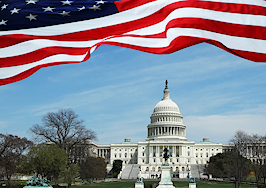In these times, double down — on your skills, on your knowledge, on you. Join us Aug. 8-10 at Inman Connect Las Vegas to lean into the shift and learn from the best. Get your ticket now for the best price.
Worsening discrimination and a rise in anti-LGBTQ legislation are holding LGBTQ homebuyers back, according to the LGBTQ+ Real Estate Alliance’s third annual report published on Wednesday.
The LGBTQ homeownership rate remains unchanged from its 2020 share of 49.8 percent — 16.1 percent behind the national average.

Ryan Weyandt
“The report uses 30 different sources, along with our annual member survey, to gain insight into the journey to homeownership for the LGBTQ+ community beginning when they first strike out on their own,” Alliance CEO Ryan Weyandt said in a written statement.
“We now have data that shows why urban centers are attractive to the LGBTQ+ community as most rent there at the start of their professional lives.”
“We also have a greater awareness of what drives community members to purchase homes, including the impact of same-sex marriage and children,” he added. “Unfortunately, the gains our growing LGBTQ+ population has made are suffering some today as a minority in our nation, including elected officials, are attacking us with greater frequency.”
The share of Alliance members who believe discrimination against LGBTQ+ homebuyers has gotten worse increased 3.1 percent year over year to 21 percent. Furthermore, the share of Alliance members who believe LGBTQ+ homebuyers are experiencing less discrimination declined 50.9 percent year over year to 12.7 percent.
The report backed up Alliance members’ insights with statistics from the Center for American Progress (CAP) and the National Fair Housing Alliance (NFHA), which both reported worsening housing outcomes for LGBTQ+ people.
CAP’s most recent survey reveals that 29 percent of LGBTQ+ people experienced housing discrimination or harassment in 2022, and the NFHA said sex-based discrimination (e.g. sexual orientation and gender identity) has become the third-most frequent form of housing discrimination complaints at 7.4 percent.

Credit: LGBTQ+ Real Estate Alliance
Alliance members said the discrimination their community faces comes from multiple avenues, including agent discrimination against LGBTQ homebuyers (19.8 percent) and renters (17.1 percent), seller discrimination (20.1 percent) and discrimination from landlords and leasing tenants (17.4 percent).
The most pervasive form of discrimination came from legal forms needing signatures that do not adequately represent the life experiences of potential homebuyers (e.g. deadnaming or misgendering nonbinary and transgender buyers) at 20.3 percent.

Erin Morrison
“The LGBTQ+ movement has never been a steady upwards climb. Dating back to the summer of 1969, we have come a long way with more wins than losses,” Alliance President Erin Morrison said of the discrimination LGBTQ people face.
“But today we are in one of those downward swings where a minority is trying to derail societal acceptance of our community which has led to millions being free to live authentically.”
“Despite hundreds of anti-LGBTQ+ bills being written, debated and voted on, the LGBTQ+ community continues to grow with a simple underlying theme: We are people, just like you,” she added. “We deserve respect, dignity and the unhindered ability to be us.”
The report also highlights the rise of anti-LGBTQ+ legislation over the past year in conservative-leaning states like Texas, Oklahoma, Kansas and Florida. The Alliance said there have been more than 320 anti-LGBTQ laws proposed in 2023 alone — three times more than the previous high (100) in 2015.
“The impact of these bills is having a profound impact on the LGBTQ+ community,” the report reads. “More than half of LGBTQ+ adults (51 percent) reported that discriminatory bills and rhetoric moderately or significantly affected their mental health or made them feel less safe. The number jumped to 81 percent for transgender people.”
The Alliance said these bills undercut LGBTQ+ people’s ability to find and secure gainful employment and create “formalized” relationships, engagements and marriages — a component that 37.7 percent of LGBTQ+ people cited in their reasoning to become homeowners.
The Alliance specifically highlighted the immediate impact of Florida’s “Don’t Say Gay” Bill, which bans lessons about sexual orientation and gender identity in primary schools. More than half of the parents (56 percent) in a UCLA Williams Institute survey of 113 households said the bill has made them consider leaving Florida. Sixteen percent have already taken steps to move, and 74.3 percent said the current political trends are a “major downside” to living in the state.
Several Alliance members shared their experiences helping LGBTQ+ clients relocate to states with LGBTQ-friendly laws.
“Almost every LGBTQ person I’m having dinner with or talking to or whatever has in the back of their mind: What’s my plan B?” said Alliance member Bob McCranie, who founded Flee Texas, a group to help LGBTQ+ people safely relocate. “How do I get out of here? This is turning, and some of the people are responding, ‘Well, we should all just stay and fight.’ A lot of us have fought for – for me, 17 years. It’s just everybody’s thinking about, ‘Where do I go next?'”
Weyandt said the Alliance is doing all it can to help the LGBTQ+ community successfully navigate the challenges of housing discrimination through its annual events, its Article 10 campaign to push the National Association of Realtors’ Realtor Political Action Committee to stop financially supporting anti-LGBTQ candidates and the launch of LGBTQplusHomes.com, a consumer-facing site that provides LGBTQ+ buyers and sellers with invaluable housing resources.
“We designed the website as a kind of one-stop-shop, if you will, where consumers can visit the site, they can explore around and they can find resources that actually pertain to them and their lives and their journey through homeownership being in the unprotected minority class in America,” Weyandt told Inman.
“Then they can connect directly with our members. We are ensuring that we’re taking our membership pool who identify as LGBTQ plus or allied professionals, and we’re giving them direct access to the public that they want to help and vice versa.”
“We’re giving our consumers direct access to professionals who we hold to a very high standard of delivering an unbiased ethical experience for all the consumers in our community,” he said while noting the Alliance will roll out several updates, including agent reviews in the upcoming months.
Despite the challenges of discrimination, Jim Obergefell, an Alliance supporter and the man at the center of the Obergefell v. Hodges ruling that secured same-sex marriage, said he’s optimistic about the LGBTQ+ community’s ability to gain crucial ground for housing rights.
“We deserve access to the same education, jobs, homes, and opportunities as others. Because we are no longer confined to known safe havens, we can become part of the fabric of neighborhoods and communities across our nation. This report proves that is already happening,” he said. “But we aren’t fully there. We must keep working to ensure our community has equal access to the American Dream of homeownership.”
“We are fortunate that the Alliance is dedicated to helping make that vision a reality! Love wins!”













